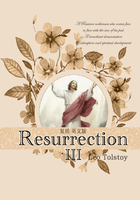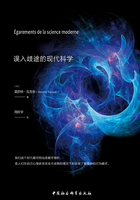Pierre had of late rarely seen his wife alone. Both in Petersburg and in Moscow their house was always full of visitors. The night after the duel he did not go to his bedroom but, as he often did, remained in his father's room, that huge room in which Count Bezukhov had died.
He lay down on the sofa meaning to fall asleep and forget all that had happened to him, but could not do so. Such a storm of feelings, thoughts, and memories suddenly arose within him that he could not fall asleep, nor even remain in one place, but had to jump up and pace the room with rapid steps. Now he seemed to see her in the early days of their marriage, with bare shoulders and a languid, passionate look on her face, and then immediately he saw beside her Dolokhov's handsome, insolent, hard, and mocking face as he had seen it at the banquet, and then that same face pale, quivering, and suffering, as it had been when he reeled and sank on the snow.
"What has happened?" he asked himself. "I have killed her lover, yes, killed my wife's lover. Yes, that was it! And why? How did I come to do it?"- "Because you married her," answered an inner voice.
"But in what was I to blame?" he asked. "In marrying her without loving her; in deceiving yourself and her." And he vividly recalled that moment after supper at Prince Vasili's, when he spoke those words he had found so difficult to utter: "I love you." "It all comes from that! Even then I felt it," he thought. "I felt then that it was not so, that I had no right to do it. And so it turns out."
He remembered his honeymoon and blushed at the recollection. Particularly vivid, humiliating, and shameful was the recollection of how one day soon after his marriage he came out of the bedroom into his study a little before noon in his silk dressing gown and found his head steward there, who, bowing respectfully, looked into his face and at his dressing gown and smiled slightly, as if expressing respectful understanding of his employer's happiness.
"But how often I have felt proud of her, proud of her majestic beauty and social tact," thought he; "been proud of my house, in which she received all Petersburg, proud of her unapproachability and beauty. So this is what I was proud of! I then thought that I did not understand her. How often when considering her character I have told myself that I was to blame for not understanding her, for not understanding that constant composure and complacency and lack of all interests or desires, and the whole secret lies in the terrible truth that she is a depraved woman. Now I have spoken that terrible word to myself all has become clear.
"Anatole used to come to borrow money from her and used to kiss her naked shoulders. She did not give him the money, but let herself be kissed. Her father in jest tried to rouse her jealousy, and she replied with a calm smile that she was not so stupid as to be jealous: 'Let him do what he pleases,' she used to say of me. One day I asked her if she felt any symptoms of pregnancy. She laughed contemptuously and said she was not a fool to want to have children, and that she was not going to have any children by me."
Then he recalled the coarseness and bluntness of her thoughts and the vulgarity of the expressions that were natural to her, though she had been brought up in the most aristocratic circles.
"I'm not such a fool…. Just you try it on…. Allez-vous promener,"[3] she used to say. Often seeing the success she had with young and old men and women Pierre could not understand why he did not love her.
"Yes, I never loved her," said he to himself; "I knew she was a depraved woman," he repeated, "but dared not admit it to myself. And now there's Dolokhov sitting in the snow with a forced smile and perhaps dying, while meeting my remorse with some forced bravado!"
Pierre was one of those people who, in spite of an appearance of what is called weak character, do not seek a confidant in their troubles. He digested his sufferings alone.
"It is all, all her fault," he said to himself; "but what of that? Why did I bind myself to her? Why did I say 'Je vous aime'[4] to her, which was a lie, and worse than a lie? I am guilty and must endure… what? A slur on my name? A misfortune for life? Oh, that's nonsense," he thought. "The slur on my name and honor- that's all apart from myself.
"Louis XVI was executed because they said he was dishonorable and a criminal," came into Pierre's head, "and from their point of view they were right, as were those too who canonized him and died a martyr's death for his sake. Then Robespierre was beheaded for being a despot. Who is right and who is wrong? No one! But if you are alive- live: tomorrow you'll die as I might have died an hour ago. And is it worth tormenting oneself, when one has only a moment of life in comparison with eternity?"
But at the moment when he imagined himself calmed by such reflections, she suddenly came into his mind as she was at the moments when he had most strongly expressed his insincere love for her, and he felt the blood rush to his heart and had again to get up and move about and break and tear whatever came to his hand. "Why did I tell her that 'Je vous aime'?" he kept repeating to himself. And when he had said it for the tenth time, Molibre's words: "Mais que diable alloit-il faire dans cette galere?" occurred to him, and he began to laugh at himself.
In the night he called his valet and told him to pack up to go to Petersburg. He could not imagine how he could speak to her now. He resolved to go away next day and leave a letter informing her of his intention to part from her forever.
Next morning when the valet came into the room with his coffee, Pierre was lying asleep on the ottoman with an open book in his hand.
He woke up and looked round for a while with a startled expression, unable to realize where he was.
"The countess told me to inquire whether your excellency was at home," said the valet.
But before Pierre could decide what answer he would send, the countess herself in a white satin dressing gown embroidered with silver and with simply dressed hair (two immense plaits twice round her lovely head like a coronet) entered the room, calm and majestic, except that there was a wrathful wrinkle on her rather prominent marble brow. With her imperturbable calm she did not begin to speak in front of the valet. She knew of the duel and had come to speak about it. She waited till the valet had set down the coffee things and left the room. Pierre looked at her timidly over his spectacles, and like a hare surrounded by hounds who lays back her ears and continues to crouch motionless before her enemies, he tried to continue reading. But feeling this to be senseless and impossible, he again glanced timidly at her. She did not sit down but looked at him with a contemptuous smile, waiting for the valet to go.
"Well, what's this now? What have you been up to now, I should like to know?" she asked sternly.
"I? What have I…?" stammered Pierre.
"So it seems you're a hero, eh? Come now, what was this duel about? What is it meant to prove? What? I ask you."
Pierre turned over heavily on the ottoman and opened his mouth, but could not reply.
"If you won't answer, I'll tell you…" Helene went on. "You believe everything you're told. You were told…" Helene laughed, "that Dolokhov was my lover," she said in French with her coarse plainness of speech, uttering the word amant as casually as any other word, "and you believed it! Well, what have you proved? What does this duel prove? That you're a fool, que vous etes un sot, but everybody knew that. What will be the result? That I shall be the laughingstock of all Moscow, that everyone will say that you, drunk and not knowing what you were about, challenged a man you are jealous of without cause." Helene raised her voice and became more and more excited, "A man who's a better man than you in every way…"
"Hm… Hm…!" growled Pierre, frowning without looking at her, and not moving a muscle.
"And how could you believe he was my lover? Why? Because I like his company? If you were cleverer and more agreeable, I should prefer yours."
"Don't speak to me… I beg you," muttered Pierre hoarsely.
"Why shouldn't I speak? I can speak as I like, and I tell you plainly that there are not many wives with husbands such as you who would not have taken lovers (des amants), but I have not done so," said she.
Pierre wished to say something, looked at her with eyes whose strange expression she did not understand, and lay down again. He was suffering physically at that moment, there was a weight on his chest and he could not breathe. He knew that he must do something to put an end to this suffering, but what he wanted to do was too terrible.
"We had better separate," he muttered in a broken voice.
"Separate? Very well, but only if you give me a fortune," said Helene. "Separate! That's a thing to frighten me with!"
Pierre leaped up from the sofa and rushed staggering toward her.
"I'll kill you!" he shouted, and seizing the marble top of a table with a strength he had never before felt, he made a step toward her brandishing the slab.
Helene's face became terrible, she shrieked and sprang aside. His father's nature showed itself in Pierre. He felt the fascination and delight of frenzy. He flung down the slab, broke it, and swooping down on her with outstretched hands shouted, "Get out!" in such a terrible voice that the whole house heard it with horror. God knows what he would have done at that moment had Helene not fled from the room.
A week later Pierre gave his wife full power to control all his estates in Great Russia, which formed the larger part of his property, and left for Petersburg alone.















